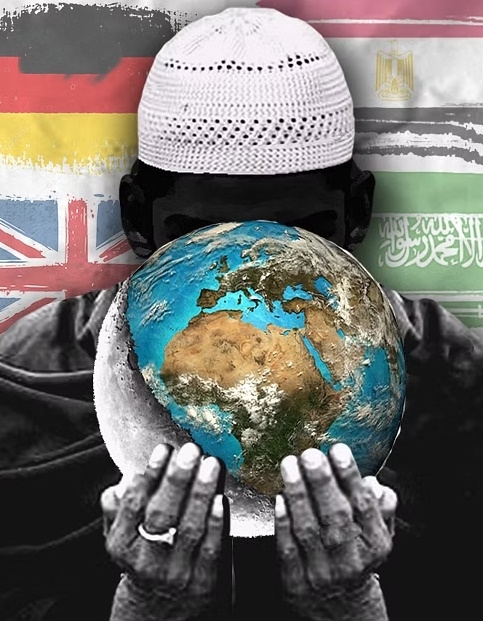By D.C.PathakIn recent years the international scene has been conditioned by new geopolitical trends that were affecting all regions particularly West Asia, Indo-Pacific and Eurasia.India now a major power influencing global events, had particular stakes in these parts of the world.
The post-Cold War years in which the US-led unipolar order prevailed for quite some time, the fall-out of the ‘war on terror’ that essentially turned out to be prolonged combat between the US-led West and the Islamic radicals and the reappearance more recently, of the polarisation between US on one hand and the China-Russia axis, on the other – following the Ukraine-Russia military confrontation – have been the major developments that are shaping the current geopolitics.
India is required to keep close track of the changing alignments within the so-called Islamic world – more so in West Asia.
This country has more Muslims than what their number was in Pakistan – the entity created through the partition of India on religious grounds in 1947.
Independent India maintained cordial relations with the Arab world particularly the Gulf countries regardless of the fact that Indo-Pak relations had turned sour on multiple counts.
We have to have a deep understanding of the cross currents in West Asia in order to maintain and strengthen India’s friendships in the region in the future.
From India’s point of view Saudi Arabia, Egypt and Iran are the three Muslim countries that hold the key to West Asia’s stability and friendly disposition towards this nation.
It is a matter of deep satisfaction for the country that Ajit Doval, India’s National Security Advisor has directly reached out to Iran and Saudi Arabia and struck an equation with them in a manner that allows India to build bilateral economic relations with them and also make a contribution as a common friend, to the alleviation of political and ideological conflict existing between them for a long time.
It is to be noted that Doval has established an ‘NSA grid’ with all major powers – in today’s world, international relations are steered at that level for the simple reason that the nation’s security and economic concerns are best evaluated there.
Foreign policy by definition is the product of these twin concerns and it is no surprise therefore that implementation of the policy framework defined largely at the level of NSAs is becoming a major function of diplomacy.
Diplomacy’s inputs for policy formulation remain of course important like before.The three pivotal countries of the West Asia-North Africa(WANA) region mentioned above, are the principal witnesses of the cross-currents flowing through the Islamic world for some time now and it is important for India to embrace them in friendship.
Saudi Arabia chairing the powerful Organisation of Islamic Conference (OIC) – the 57-member block of Muslim countries – had traditionally had an equation of friendship with the US run on an extremely strict framework of fundamentalist Islam, the Saudi regime has, through the OIC platform, endorsed the idea of Muslims all over the world is regarded as Ummah and justified the logic of this forum voicing concern over any problem that the Muslim community might be facing anywhere.
Pakistan a key member of OIC, had with its large army lent military support to Saudi Arabia for the latter’s security and that could be one reason why Pakistan was able to get OIC to raise the issue of abrogation of Article 370 relating to Kashmir, by the Indian Parliament.It is also, however, true that the Saudi kingdom while being aware of Indo-Pak conflicts, has moved towards establishing a deep bilateral friendship with India under the Narendra Modi regime.
A significant development impacting Saudi Arabia’s approach to international relations was the rise of Islamic radicals in the Muslim world in the wake of the US-led ‘war on terror’ launched first in Afghanistan and then in the Iraq-Syria belt.This made Saudi Arabia more vulnerable to attacks from radicals because of the country’s known alliance with the US.
The return of the Taliban Emirate in Kabul in 2019, the failure of US-backed Islamists to oust the Assad regime in Syria and the growing importance of China in the region on account of the Sino-Pak axis – an ‘adjustment’ was already worked out by Pakistan between Taliban-dominated Afghanistan and China – are the major recent developments shaping the West Asian scene.
A powerful voice in OIC has been taking the line that Islamic radical groups should not be rejected just because they were ideologically opposed to the US-led West.
Pakistan, Turkey, Malaysia, Yemen and Qatar had an attitude of acceptance towards radicals whose mandate of return to the puritan Islam of the ‘golden period’ of the first four Caliphs, had an inherent appeal to all those faithful.Also, US administrations have risen above the ill-conceived logic of ‘good terrorists vs bad terrorists’ that was based on a distinction between Islamic extremists who remained on the right side of the US and the radicals of Taliban, Al Qaeda and ISIS who looked upon the US as their prime enemy.
It was perhaps realised that both these groups could foster faith-based terrorism that was a huge danger to the democratic world led by the US.
US President Donald Trump who denounced his rival, Hillary Clinton, in the election campaign for not criticising violence in the name of Islam out of her concern for remaining ‘politically correct’, told the Arab countries in Riyadh in 2017 that they should sort out their sectoral problems with others in the Muslim world, on their own.
The successor Biden administration has also been circumspect about supporting Islamic fundamentalist regimes.There is a realisation in the Saudi camp that violence in the name of religion by invoking Jehad, can not be upheld in present times.
Saudi Arabia and its close partner UAE, have also made the balancing move of not getting caught in the emerging Cold War kind of polarisation between the US on one hand and the China-Russia combine on the other in the wake of the Ukraine-Russia military confrontation.
Egypt with its long civilisational history has a key position in the Arab world and has been the largest trading partner of India in Africa.
It is home to the Muslim Brotherhood founded by the Egyptian thinker Hasan Al Banna in 1928 to oppose the nationalist and pro-left regime of Gen.Nasser and establish an Islamic rule based on the mandate that the ‘Quran is the best Constitution’.
Following the ‘Arab Spring’ of 2011 that compelled the military to depose President Hosni Mubarak, and a leader of the Muslim Brotherhood – Mohammad Morsi – became the first elected President of Egypt in 2012.The ‘Arab Spring’ was fronted by liberals but its real strength came from Muslim Brotherhood known for its large organisation and influence.
As Muslim Brotherhood started exercising an overbearing influence on all facets of governance including the judiciary and even armed forces, the military in a ‘counter-revolution’ in 2013, removed Morsi from office, banned Muslim Brotherhood and rounded up thousands of activists of different ideological backgrounds.
Gen.
Abdul Fattah Al-Sisi the new President put Morsi on trial- the latter dying in 2019 in court.Muslim Brotherhood advocated an Islamic rule that was not in conflict with the West and Morsi’s rise to power was therefore appreciated by the US administration.
Egypt-US relations have, however, been friendly during Al Sisi’s rule too.Egypt’s friendship with India has been further strengthened after the 2015 meeting of Prime Minister Modi with President Al Sisi in New York.Al Sisi was the Chief Guest at the Republic Day Parade in Delhi this year and the occasion marked the elevation of relations to a strategic level.
Egypt is firmly against radicalisation and cross-border terrorism and the two countries have affirmed zero tolerance towards terrorism.
Egypt is thus a key ally of India in the Muslim world.
UAE does today what Saudi Arabia would do tomorrow- the launch of I2U2 in 2021 and the subsequent Chinese mediation between Iran and Saudi Arabia in 2023 somewhere prove the point.Iran’s hostility towards Saudi Arabia is the outcome not only of the historical legacy of the Shia-Sunni conflict resulting from the Kharijite revolt against Caliph Ali but also of the added complication of the two countries differing in their approach to the US.
I2U2 – described in some quarters as the Quad of West Asia – is a multi-lateral forum comprising Israel, India, the US and UAE that was formed at the meeting of the four foreign ministers in the fall of 2021, for economic and technological cooperation.
India’s strategy of developing bilateral friendships with Israel, Iran and the UAE-Saudi Arabia duo, helped to bridge the faith-based gulfs that had been the hallmark of West Asia’s history.The rapprochement between Iran and Saudi Arabia worked out by China should be seen in the backdrop of these two West Asian countries being the largest trading partners of China, the shared hostility of Iran and China towards the US and the willingness of Saudi Arabia to reduce the arc of confrontation facing the country because of its past political alignments.
It is good to see India handling the Muslim world in general and West Asia in particular with great finesse, strategic merit and consideration of India’s own security and economic interests.Without giving any quarters to Pakistan, India has enhanced its outreach to Islamic countries and developed strategic friendships in the Gulf and elsewhere steering clear of the faith-based or political divides among them.
Ajit Doval, India’s NSA, has played a leading role in steering these foreign policy moves.In a brilliant initiative meant to counter the adverse effects of the reinstallation of Kabul Emirate under the Taliban, he hosted a meeting of his counterparts from Russia, CARs and Iran-Pakistan and China though invited did not respond as was anticipated – in November 2021, where the call for an inclusive and democratic rule in Afghanistan was upheld and terrorism and radicalisation were firmly opposed.
The NSA has established a strong grid with his counterparts from major powers including the US and Russia and strengthened the goodwill of the international community for India.The friendly environment has further facilitated Prime Minister Modi’s rise as a wise counsel on the global stage.
Doval recently visited Saudi Arabia and Iran to cement India’s friendship with these important nodal countries of the Islamic world -which had their own compulsions about maintaining alignments within that world.Also, India’s moves to keep strategic partnership with the US on a special footing without letting this come in the way of close bonds with Russia, have proved extremely fruitful and kept India on top of the situation as far as international relations were concerned.
(The writer is a former Director of the Intelligence Bureau.Views expressed are personal)
dcpathak/sha
#Cross #Islamic #Column #Delhi #Narendra Modi # Narendra Modi #Ajit #Ali #China #Delhi #Russia #Gulf #Turkey #Riyadh #Idea #Axis #Democratic #Narendra
.






